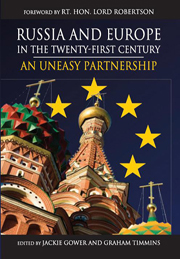Book contents
- Frontmatter
- Contents
- List of Contributors
- Acknowledgements
- List of Abbreviations/Acronyms
- Foreword Russia and Europe
- Preface
- Introduction Russia and Europe: What Kind of Partnership?
- PART 1 Russia looking West
- PART 2 Europe looking East
- Chapter 7 The European Union's Policy on Russia: Rhetoric or Reality?
- Chapter 8 The Role of Norms and Values in the European Union's Russia Policy
- Chapter 9 NATO and Russia: Progress or Process?
- Chapter 10 German-Russian Bilateral Relations and EU Policy on Russia: Reconciling the Two-Level Game?
- Chapter 11 Shortcut to Great Power: France and Russia in Pursuit of Multipolarity
- Chapter 12 A Europe Divided by Russia?: The New Eastern Member States and the EU's Policy towards the East
- PART 3 Partnership in Practice
- Conclusion Russia and Europe: An Uneasy Partnership 289
- Index
- More Titles in this series
Chapter 10 - German-Russian Bilateral Relations and EU Policy on Russia: Reconciling the Two-Level Game?
from PART 2 - Europe looking East
Published online by Cambridge University Press: 05 March 2012
- Frontmatter
- Contents
- List of Contributors
- Acknowledgements
- List of Abbreviations/Acronyms
- Foreword Russia and Europe
- Preface
- Introduction Russia and Europe: What Kind of Partnership?
- PART 1 Russia looking West
- PART 2 Europe looking East
- Chapter 7 The European Union's Policy on Russia: Rhetoric or Reality?
- Chapter 8 The Role of Norms and Values in the European Union's Russia Policy
- Chapter 9 NATO and Russia: Progress or Process?
- Chapter 10 German-Russian Bilateral Relations and EU Policy on Russia: Reconciling the Two-Level Game?
- Chapter 11 Shortcut to Great Power: France and Russia in Pursuit of Multipolarity
- Chapter 12 A Europe Divided by Russia?: The New Eastern Member States and the EU's Policy towards the East
- PART 3 Partnership in Practice
- Conclusion Russia and Europe: An Uneasy Partnership 289
- Index
- More Titles in this series
Summary
Introduction: The Common Foreign and Security Policy and Russia
The election of Vladimir Putin as Russian President in March 2000 presented the European Union (EU) with a window of opportunity to develop its relations with the ‘ New Russia’. Whereas the Yeltsin regime had pursued a policy of benign neglect towards the EU throughout the 1990s and had focussed its attention more on North Atlantic Treaty Organization (NATO) and US relations, Putin had quickly recognized the potential that Russia’ s relations with the EU presented in supporting the domestic priority of economic modernization. Yet when the Commission report on relations with Russia was published in February 2004 and acknowledged that motivations for cooperation between the EU and Russia existed in a wide range of areas, it was noted that relations had come under ‘ increasing strain’ on sensitive issues. The response, it was argued, was for the Commission and the member states to ‘ concert their positions and speak with one voice’ in order to project a coherent and consistent policy line in negotiations with the Russian government. The report highlighted two interconnected sets of concerns; the first being the institutional shortcomings of the EU's Common Foreign and Security Policy (CFSP) in general terms and the second specifically focused on the emerging ‘ two-level game’ influencing the internal dynamics of EU policymaking on Russia.
The first of these two concerns relates to the incremental fashion in which EU foreign policymaking has developed since the end of the Cold War and the RUSSIA AND EUROPE IN THE TWENTY-FIRST CENTURY establishment of the CFSP in 1992.
- Type
- Chapter
- Information
- Russia and Europe in the Twenty-First CenturyAn Uneasy Partnership, pp. 169 - 184Publisher: Anthem PressPrint publication year: 2007



